

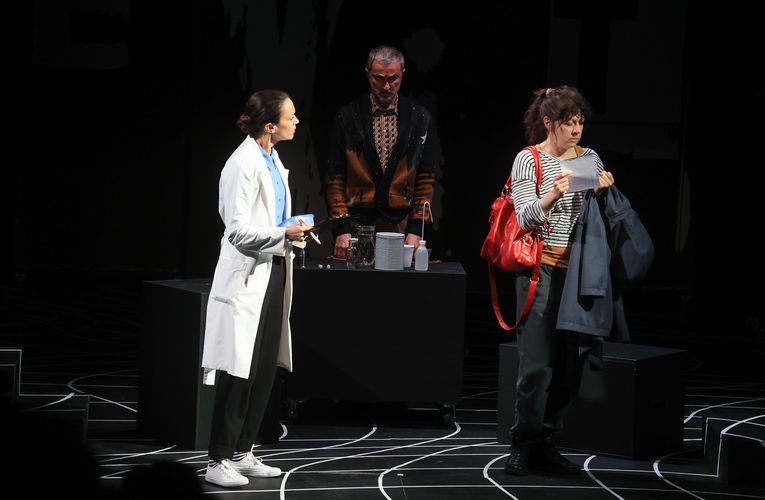

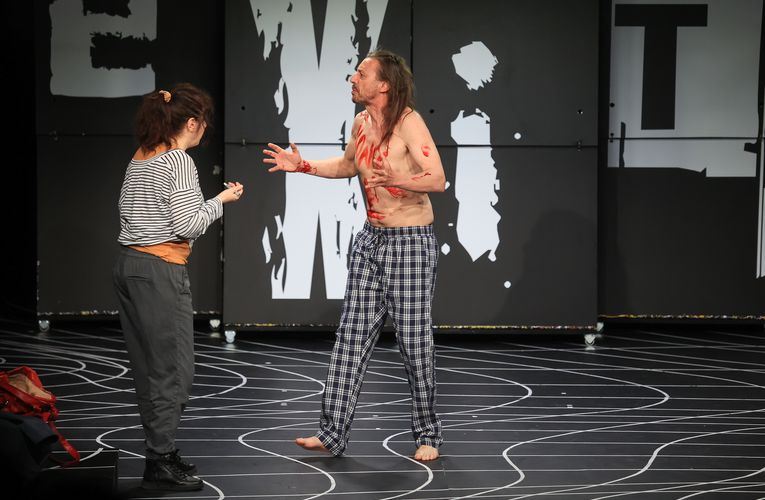

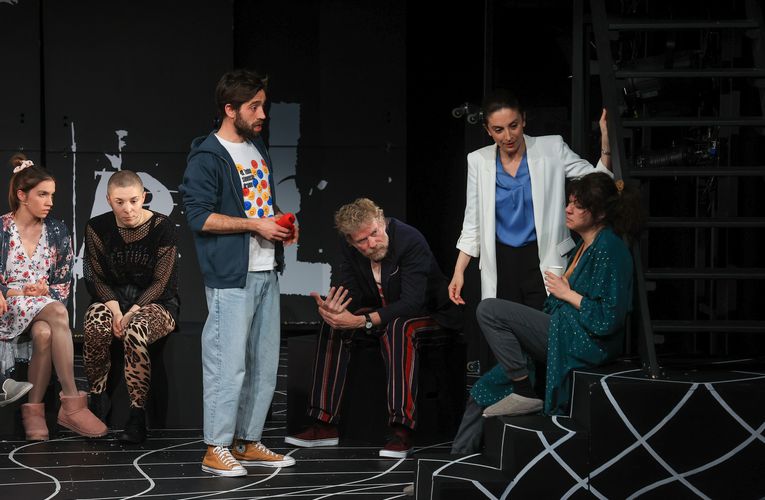


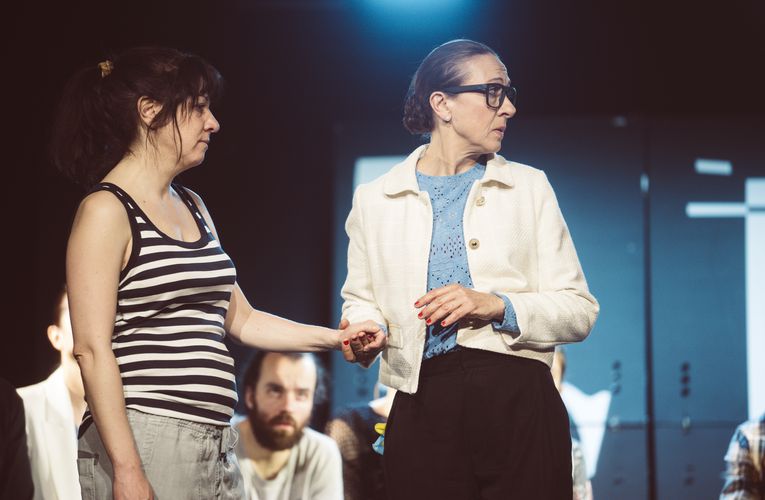
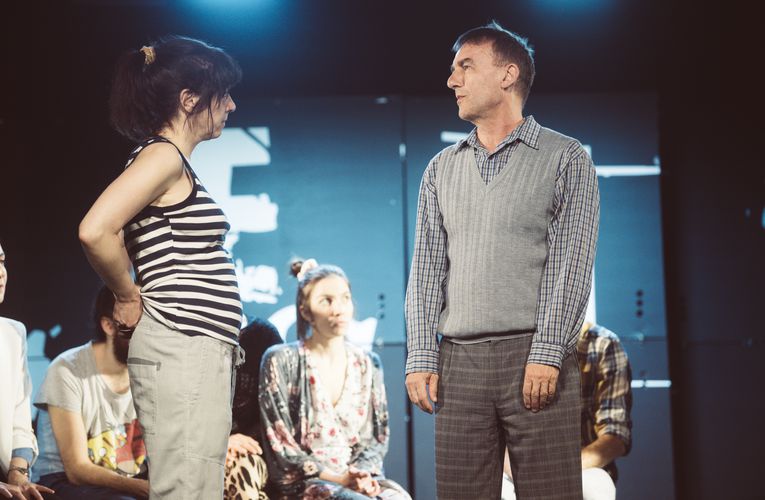
People, Places & Things
- Emma
- Foster
- Doctor
- Therapist
- Mark
- Paul
- Laura, Emma 1
- Klara KastelecMeredith, Emma 2
- Jodi, Emma 3
- Shaun, Emma 4
- T, Konstantin
- Mum
- Dad
- Liam HledeStage technician, Paramedic
- Translation: Andrej E. Skubic
- Dramaturgy: Evelin Bizjak
- Assistant dramaturg: Helena Šukljan
- Set design: Miloš Narobe
- Set designer assistant: Sandi Mikluž
- Costume design: Neli Štrukelj
- Costume design assistant: Estera Lovrec
- Visual concept and puppets design: Barbara Bulatović
- Puppetry workshop and animation: Brane Vižintin
- Choreography: Branko Potočan
- Language consultant: Mateja Dermelj
- Lighting design: Matjaž Brišar
- Sound design: Marijan Sajovic
- Make-up artist: Nathalie Horvat
- Assistant director: Mitja Lovše
- Hospitantka: Amber Buck-Burrows
- Stage manager: Liam Hlede
Puppetry technology: Aleksander Andželović, Barbara Bulatović and Mitja Ritmanič
Mladinsko stages the play People, Places & Things by the acclaimed English playwright Duncan Macmillan, who has been experiencing a breakthrough to the European (including Slovenian) stages. His signature unfettered, ostensibly simple realistic style presents the topics often encountered in theatre, such as family and relationships, education, personal disorders, suicidal tendencies, drug and alcohol dependency in a complex way, without didactic psychologisation and unambiguous solutions that would force characters and situations into recognised moulds.
Emma is an actor and an addict. Her work requires that she split into different personalities, so she finds is difficult to confront herself during rehabilitation. Does she even exist outside of her stage versions? Her first attempt to get clean at a treatment facility fails, because she’s not able to honestly and credulously dedicate herself to therapy, particularly group therapy. Macmillan juxtaposes Emma’s dependency on intoxicating substances in a very efficient theatrical way with her acting addiction to attention, performing in front of an audience, striving for success and fame, a painful inability to not act, and at the same time he doesn’t hint that there might be an easy way out. Just like work, family can be a trigger for addiction: people, places, things. And if intoxication is the only way of survival in a modern world, how can a person ever get clean? The first step for Emma is to admit to herself that she has a problem. If she wants to ever work as an actress again, she has to rebuild herself completely.
The director led the actors and at the same time let them authentically express both, their aggressiveness and mercilessness, and their amicable understanding, gentle presence and human warmth. […] In any case, this is a very successful production that can be an excellent starting point for a debate with young adults. It is not only Majzelj, a superb actress, who surprises with her authenticity, but also Daša Dobršek as the therapist and Klara Kastelec, Nataša Keser and Klemen Kovačič who play fellow addicts at the clinic. They convince us that every now and then, it is possible to start a new life.
When trying to characterise the protagonist, the first part of the text successfully avoids being trapped into a unified, consistent personality that would identify with past trauma and use it to excuse her own actions. The author tries to show addiction in a more complex way, as a product of accidental or less accidental events and emotions, but also as a product of the constant pressure on the individual to ever-increasing efficiency, success and functionality. […] The production is saved by the strong, entertaining and complex dialogues, which unfortunately ebb towards the end, but especially by Janja Majzelj’s outstanding presence, cogency and energy.
Macmillan built his entire text on playing between theatre and life, truth and lie, and his masterfully written dialogues constantly pull the carpet from under the seemingly tangible facts. […] By focusing on the text and including surrealistic elements in the space, Pograjc creates a world that is at once known and unusual and invites us to question the borders between the real and the imaginary. At the forefront of this intertwining is the large ensemble […] with Janja Majzelj in the role of Emma. As the central figure of the dramatic action, Majzelj captures the protagonist’s complex emotions with authenticity and vulnerability and adds a perfectly measured dose of cynism so that the question of the reality of her performance remains open. By perfectly nuancing their own interpretations the rest of the cast brings depth and layers to Emma’s story, which allows them to successfully navigate between establishing their own drama characters and emphasising the state of the protagonist’s soul.
A touching drama of the struggle to survive that focuses on the dynamics and resolutions of the stories of addiction (and therefore takes place mostly in a rehab centre) builds upon the similar scenarios of the treated patients, but never slides into creating cliches. In the production (which also includes marionettes) this tableau, full of mirroring from the great canvas of society to the individual and back to the image of the non-reflected destructions and nihilisms of the society, focuses on the female trauma and her wounded autonomous essence. The fantastic Janja Majzelj, witty and brutally convincing, astonishing in the indescribable suffering that accompanies the destroyed actress’s recovery – pieces together Emma’s torn and broken personality, burdened with denial, guilt and shame. The production thus covers several perspectives, through which we can observe a human figure and its role in theatre and the world. It is about the division between illusion and reality, about the tension between intense acting of roles and the dull landing in one’s own self. Not that emphasised, but present, in addition to support groups, the belief in support immanence also shows to be trustworthy.
Alcoholics Anonymous Slovenia and Ivica Topić